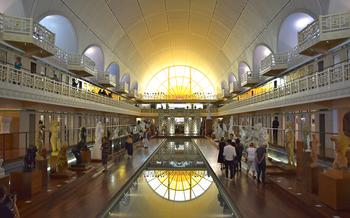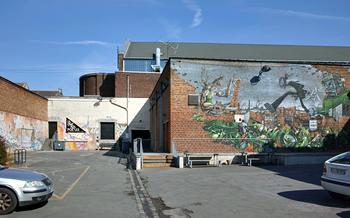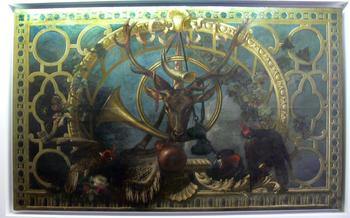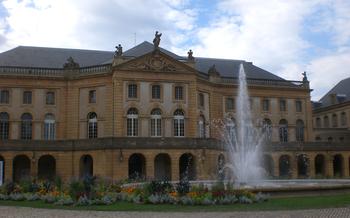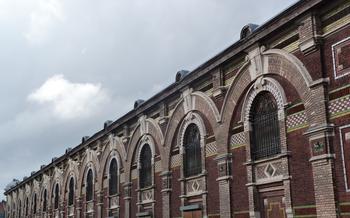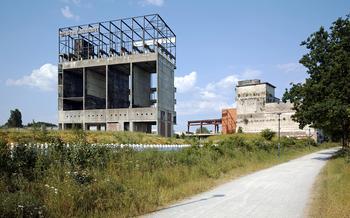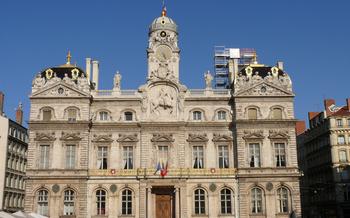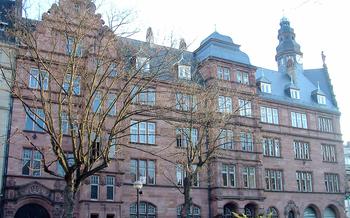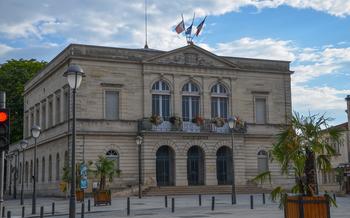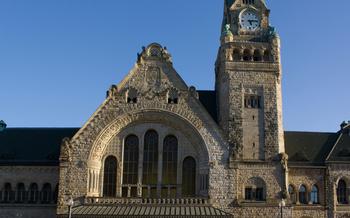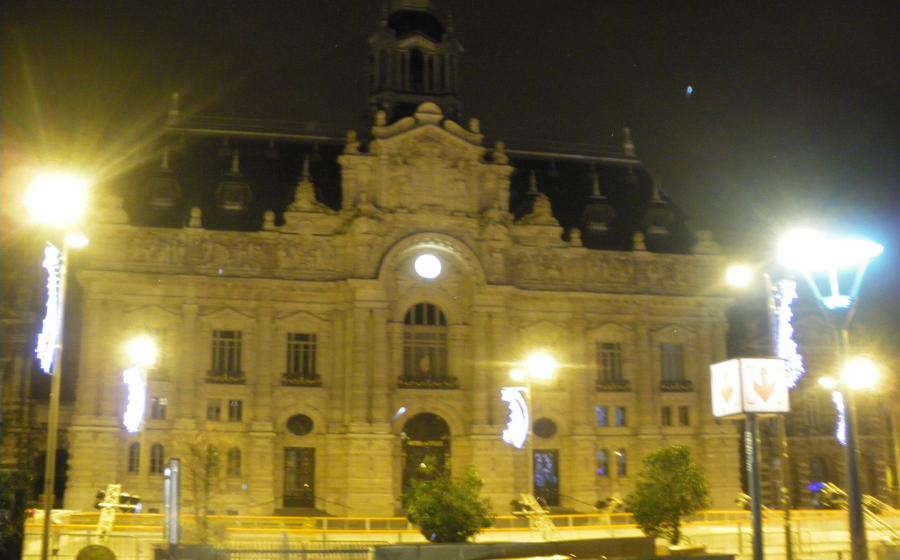
L'Hôtel de Ville
- Historical Significance
- Architectural Features
- Symbol of Civic Pride
- Art and Culture
- Guided Tours
- Changing Exhibitions
- Accessibility
- Surrounding Attractions
- Local Cuisine
- Shopping and Boutiques
- Accommodations
- Transportation
- Parking
- Tips for Visitors
- Insider Tip: Uncover the Hidden History of the Underground Passages
Historical Significance
Roubaix, once a humble village, transformed into a thriving industrial hub during the 19th century. The textile industry, particularly wool production, played a pivotal role in shaping the city's identity. L'Hôtel de Ville stands as a testament to this prosperous era, symbolizing Roubaix's rise as a major industrial center. Its architectural grandeur reflects the city's economic success and the wealth accumulated by its textile barons.
The Hôtel de Ville is a masterpiece of architectural design, showcasing a blend of Renaissance and Flemish influences. Its imposing red brick facade, adorned with intricate carvings and sculptures, exudes an aura of opulence and grandeur. The building's elaborate interiors, with their marble staircases, stained glass windows, and ornate chandeliers, further enhance its majestic appeal.
In recognition of its historical and architectural significance, the Hôtel de Ville was classified as a historical monument in 197This designation underscores the building's importance as a symbol of Roubaix's rich heritage and its contribution to the city's architectural landscape.
Architectural Features
The L'Hôtel de Ville is a masterpiece of architectural design, showcasing a unique blend of influences. Its striking red brick facade, a hallmark of Roubaix's industrial heritage, exudes a sense of grandeur and solidity. The intricate carvings adorning the building's exterior, from the delicate friezes to the elaborate moldings, demonstrate the painstaking craftsmanship and attention to detail that went into its construction.
The building's opulent interiors are equally impressive, featuring soaring ceilings, grand staircases, and ornate chandeliers. The walls are adorned with exquisite tapestries and works of art, adding to the building's opulent atmosphere. The stained-glass windows, with their vibrant colors and intricate designs, cast a warm and ethereal glow throughout the interior spaces.
The L'Hôtel de Ville is renowned for its harmonious fusion of architectural styles. The Gothic-inspired pointed arches and ribbed vaults blend seamlessly with the Renaissance-style ornamentation, creating a unique and captivating aesthetic. The building's clock tower, with its intricate spire and decorative elements, is a testament to the architects' skill in incorporating diverse influences into a cohesive and visually stunning design.
The work of the renowned architect Victor Laloux, who also designed the Gare d'Orsay in Paris, is evident throughout the L'Hôtel de Ville. His signature style, characterized by a combination of classical and modern elements, is showcased in the building's overall design, as well as in the intricate details and ornamentation that adorn its facade and interiors. Laloux's vision transformed the L'Hôtel de Ville into a true architectural masterpiece, a symbol of Roubaix's prosperity and cultural heritage.
Symbol of Civic Pride
The L'Hôtel de Ville stands as a testament to Roubaix's civic pride and identity. It is the heart of the city's administrative and political life, hosting official ceremonies, events, and gatherings that bring the community together. The building's grand architecture and imposing presence reflect the city's rich history and its commitment to progress.
As the seat of local government, the L'Hôtel de Ville plays a crucial role in shaping the city's policies and initiatives. It is a place where decisions are made, plans are formulated, and the future of Roubaix is envisioned. The building's impressive interiors, with their ornate decorations and spacious halls, provide a fitting backdrop for these important deliberations.
The location of the L'Hôtel de Ville in the heart of Roubaix is symbolic of its central role in the city's life. It is situated on the Grand-Place, a bustling square that serves as a meeting point for residents and visitors alike. The building's prominent position, overlooking the square, reinforces its status as a symbol of civic authority and leadership.
The L'Hôtel de Ville is not just a functional administrative center but also a source of pride for the people of Roubaix. Its architectural grandeur and historical significance make it a beloved landmark that embodies the city's spirit and heritage. Visitors to Roubaix are drawn to the L'Hôtel de Ville, not only for its beauty and historical importance but also for the sense of civic pride and community it represents.
Art and Culture
The L'Hôtel de Ville is not just a symbol of civic pride but also a vibrant hub for art and culture in Roubaix. The building's grand interiors provide a stunning backdrop for a variety of artistic expressions. Notable works of art, including sculptures, paintings, and tapestries, adorn the walls and halls, adding to the building's aesthetic appeal.
The L'Hôtel de Ville regularly hosts cultural events, exhibitions, and performances that showcase local and international talent. These events range from art exhibitions featuring contemporary and historical works to classical music concerts, theater productions, and dance performances. The building's versatile spaces can accommodate a diverse range of artistic endeavors, creating a dynamic and stimulating cultural environment.
The L'Hôtel de Ville's commitment to promoting art and culture extends beyond its own walls. The building often collaborates with local museums, galleries, and cultural institutions to organize joint exhibitions, workshops, and educational programs. These collaborations not only enrich the cultural landscape of Roubaix but also foster a sense of community and engagement among residents and visitors alike.
Guided Tours
Unveiling the History and Splendors of Roubaix's Architectural Masterpiece
For a deeper dive into the history and architectural significance of the L'Hôtel de Ville, visitors can embark on a guided tour of this magnificent building. These tours are typically offered at specific times throughout the day and provide a wealth of insights and anecdotes that bring the building's past to life.
During the guided tour, visitors will be taken through the various halls and chambers of the L'Hôtel de Ville, each adorned with intricate carvings, opulent chandeliers, and stained glass windows. Expert guides will share fascinating stories about the building's construction, its role in Roubaix's industrial heritage, and the notable figures who have graced its halls.
Visitors will also learn about the architectural influences that shaped the L'Hôtel de Ville's unique style, blending elements of Flemish Renaissance, Gothic Revival, and Art Nouveau. The guides will point out hidden details and symbols that reveal the craftsmanship and artistry that went into every corner of the building.
To book a guided tour, visitors can contact the Roubaix Tourism Office in advance to check availability and make reservations. Group tours can be arranged upon request. Guided tours are an excellent way to gain a deeper understanding and appreciation for this architectural masterpiece and its significance in Roubaix's history and culture.
Changing Exhibitions
The L'Hôtel de Ville is not only a testament to Roubaix's rich history and architectural prowess but also a vibrant hub for art and cultural exchange. The building hosts a series of temporary exhibitions throughout the year, each showcasing a diverse range of topics that cater to a wide audience.
These exhibitions delve into various themes, from local history and heritage to contemporary art and cutting-edge installations. Visitors can expect to encounter thought-provoking displays, immersive experiences, and a platform for emerging artists to showcase their talents.
The frequency of these exhibitions ensures that there is always something new to discover at the L'Hôtel de Ville. Whether you are an art enthusiast, a history buff, or simply looking for a unique cultural experience, these exhibitions offer a captivating journey into the world of art and creativity.
Don't miss the opportunity to immerse yourself in the vibrant cultural landscape of Roubaix and explore the ever-changing exhibitions at the L'Hôtel de Ville. Let the art speak to you, challenge your perspectives, and leave you with a lasting impression of this remarkable city.
Accessibility
The L'Hôtel de Ville of Roubaix is committed to providing an inclusive and accessible experience for all visitors. The building is equipped with a range of accessibility features to ensure that visitors with disabilities can fully enjoy and explore the premises.
Ramps and elevators are strategically placed throughout the building, allowing wheelchair users and individuals with limited mobility to navigate the different levels and spaces with ease. Accessible restrooms are also available, ensuring the comfort and convenience of all visitors.
In addition, the L'Hôtel de Ville staff is trained to assist visitors with disabilities and provide any necessary support or accommodations. They are always willing to go the extra mile to ensure that everyone has an enjoyable and memorable experience during their visit.
For visitors with visual impairments, audio guides and descriptive signage are available to enhance their understanding and appreciation of the building's history, architecture, and artwork. Braille signage is also provided to assist visitors who are blind or visually impaired in navigating the premises independently.
The L'Hôtel de Ville of Roubaix is dedicated to creating an inclusive environment where everyone feels welcome and able to fully engage with the building's cultural and historical offerings.
Surrounding Attractions
The L'Hôtel de Ville stands at the heart of Roubaix, surrounded by a tapestry of historical and cultural attractions that beckon visitors to explore the city's rich heritage. A short stroll from the Hôtel de Ville, the La Piscine Museum invites art enthusiasts to immerse themselves in a former Art Deco swimming pool transformed into a vibrant contemporary art space.
For a glimpse into Roubaix's industrial past, visitors can head to the Musée de la Manufacture and discover the fascinating history of textile manufacturing that once defined the city's identity. The museum showcases vintage machinery, interactive exhibits, and captivating stories that bring the industrial era to life.
History buffs can delve deeper into Roubaix's past at the Musée d'Art et d'Industrie André Diligent, renowned for its collection of paintings, sculptures, and decorative arts that chronicle the city's evolution.
Nature lovers will find solace in the verdant expanse of the Parc Barbieux, a sprawling urban park adorned with picturesque gardens, serene ponds, and majestic trees. The park offers a tranquil retreat from the city's hustle and bustle, inviting visitors to relax, stroll, or engage in outdoor activities.
Roubaix is a city that pulsates with creativity and innovation, and visitors can experience this vibrant energy at the La Condition Publique, a former spinning mill transformed into a thriving cultural hub. The venue hosts exhibitions, concerts, performances, and workshops that showcase local and international talent, providing a platform for artistic expression and community engagement.
Local Cuisine
Roubaix offers a delightful culinary experience, showcasing the region's rich gastronomic traditions. Visitors can indulge in traditional dishes that reflect the city's industrial heritage, such as the hearty dish of Potjevleesch, a flavorful stew made with various meats and vegetables. For a taste of local flavors, head to the vibrant marché (market) in the heart of the city, where vendors offer fresh produce, artisanal cheeses, and regional specialties. Several charming restaurants and cafés surround the L'Hôtel de Ville, providing a tempting array of culinary options. Don't miss the opportunity to sample the famous "Welsh," a local favorite consisting of melted cheese and beer, served with bread or fries. Roubaix also hosts regular food festivals and gastronomic events, allowing visitors to immerse themselves in the city's culinary scene and discover the diverse flavors of the region.
Shopping and Boutiques
Roubaix has a rich textile history and is renowned for its exceptional shopping opportunities, particularly for fabrics and textiles. The city is home to La Redoute, an iconic shopping center with a stunning architectural design. Visitors can explore the center's numerous boutiques and outlets, offering a wide range of textiles, clothing, and home goods.
Beyond La Redoute, Roubaix boasts several charming shopping streets and boutiques where visitors can find unique and locally crafted items. Rue de la Gare is a vibrant shopping street lined with independent boutiques, vintage shops, and specialty stores. Rue des Arts offers a more artistic atmosphere, with galleries, antique shops, and artisanal boutiques showcasing local talents.
For those seeking authentic souvenirs or regional products, the marchés (markets) of Roubaix are a must-visit. The Marché de l'Épeule, held every Tuesday and Friday, is a bustling market offering fresh produce, local cheeses, handcrafted items, and more. The Marché de Noël, held during the festive season, transforms the city into a winter wonderland, with stalls selling unique gifts, decorations, and seasonal treats.
Accommodations
When choosing a hotel in Roubaix, there are several factors to consider. Proximity to the L'Hôtel de Ville is a key factor for those who want to be within easy walking distance of the landmark. Amenities such as restaurants, bars, and shopping options in the surrounding area are also important considerations. Budget is another crucial factor, as Roubaix offers a range of accommodation options to suit different needs and preferences.
For a luxurious and memorable stay, visitors can consider the five-star Grand Hôtel de Roubaix. Located just a short walk from the L'Hôtel de Ville, this historic hotel offers elegant rooms, a renowned restaurant, and a spa. For a more budget-friendly option, the Hôtel des Arts is a charming three-star hotel with modern amenities and a convenient location near the city center.
Those seeking a unique and authentic experience may want to consider staying at one of Roubaix's many charming guesthouses or bed and breakfasts. These establishments often offer a more personalized service and the opportunity to interact with local residents.
Transportation
Roubaix is conveniently connected by various transportation options, making it easily accessible for visitors. The city is well-served by its local public transportation system, including buses and trams, which offer affordable and efficient ways to get around. The L'Hôtel de Ville is strategically located in the heart of Roubaix, ensuring easy access from different parts of the city. Visitors can plan their journey using the public transportation network, which provides real-time information and route planning assistance.
For those arriving by train, Roubaix has direct connections to major cities in France and neighboring countries. The Roubaix train station is a short walk from the L'Hôtel de Ville, allowing visitors to seamlessly transition from rail travel to exploring the city's attractions.
Additionally, Roubaix welcomes travelers who prefer the flexibility of car travel. Rental car services are available at the train station and throughout the city. Visitors can enjoy the convenience of exploring the region at their own pace, with ample parking options available near the L'Hôtel de Ville. Whether by train, bus, tram, or car, Roubaix offers a range of transportation options to suit every traveler's needs and preferences.
Parking
Parking options near the L'Hôtel de Ville are ample and convenient. Visitors can choose from several public parking lots located within walking distance of the building. These parking lots typically offer affordable rates and ample space, making them a suitable choice for both short and long-term parking. Street parking is also available in the surrounding streets, but it may be more limited and subject to parking restrictions or regulations. Visitors should pay attention to signage and follow any instructions or restrictions to avoid fines or inconvenience. If the area is particularly busy or crowded, alternative parking locations can be found in nearby neighborhoods or shopping centers. These options may require a slightly longer walk but can provide more flexibility and availability.
Tips for Visitors
To fully appreciate the architectural details and historical significance of the L'Hôtel de Ville, consider booking a guided tour. These tours offer a wealth of insights and anecdotes that bring the building's past to life. It's advisable to plan your visit outside of peak tourist season to avoid crowds and enjoy a more intimate and personalized experience. Additionally, combining your visit to the L'Hôtel de Ville with other nearby attractions, such as the Musée d'Art et d'Industrie or the Parc Barbieux, allows you to create a comprehensive itinerary that showcases the diverse cultural offerings of Roubaix.
Insider Tip: Uncover the Hidden History of the Underground Passages
Beneath the bustling streets of Roubaix lies a hidden world of underground tunnels and passages that served as a vital part of the city's industrial heritage. These subterranean labyrinths were once used to transport goods and materials between factories and warehouses, allowing Roubaix to maintain its status as a textile powerhouse.
While most of these tunnels are now closed off, a few select passages have been restored and opened to the public, offering visitors a glimpse into the city's forgotten past. To discover these hidden gems, join a guided tour that takes you through the depths of Roubaix's underground network. Explore the dimly lit tunnels, admire the sturdy brickwork, and learn about the fascinating stories of the people who worked in these subterranean spaces.
This unique experience is a must for history buffs and anyone interested in uncovering the hidden secrets of Roubaix. Don't miss the chance to delve into the city's industrial heritage and discover the hidden world beneath your feet.
